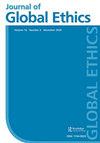On the editorial process
Q2 Arts and Humanities
引用次数: 0
Abstract
In the Editorial for the previous issue of Journal of Global Ethics, we selected to discuss COVID19, a global issue affecting very nearly all of us in unprecedented ways. The disease continues as a first priority health concern around the globe. Now that we have just entered the hopedfor era of vaccination, previously anticipated concerns for global justice regarding equitable distribution of the vaccine are now added. We cannot continue with expansion of the COVID-19 story in this issue’s editorial, since COVID-19 has meant delays in production and publication of this final issue for 2020, and uncertainty has also led us to an unexpected longer than usual page count. Consequently, the issue opens with what must be a brief editorial, and we have chosen to focus on the circumstances of the journal’s production. Some readers are very familiar with various aspects of editors’ approaches for compiling any given journal issue. But Journal of Global Ethics has as its ideal to be read around the globe, and to receive contributions from early-career professionals who may be less familiar with the mechanics of academic journals as well as non-academic practitioners concerned with diverse issues from around the globe. We can expect that some will be unfamiliar with standard practices, and nearly all will be unfamiliar with any given journal’s specific practices. For this editorial, we will use a bit of space to explain this journal’s practices further. We do so particularly for the purpose of transparency, and for encouraging contributions from those who may be less familiar with placement of material in this journal and in other such publications. We do this for the sake of the diverse readership we aspire to and to promote the aims of the journal itself: for global discourse is itself a part of global ethics. More than half of the material in Journal of Global Ethics includes full topical special issues, issues of selected papers from International Development Ethics Association conferences, guest-edited sections, and further invited content that is selected by ourselves, the journal editors. We think that guest-edited sections and full special issues, in particular, allow more diverse voices to enter discussion of global ethics. We encourage proposals for issues focused on less-discussed global, regional and disciplinary themes and promote open callsfor-papers. Further details concerning the process of making a proposal lie further below. Journal of Global Ethics is a peer-reviewed scholarly journal, and refereed submissions to the journal generally fill a third to a half of its pages in any given year. We consider the process for publishing reviewed articles to be the journal’s main work and to take general priority with respect to timelines to publication also. The refereeing process for standard submissions received at https://mc.manuscriptcentral.com/rjge is transparent as a matter of course. Such transparency is the very infrastructure of academe, providing a basis for hiring, tenure and promotion decisions. The infrastructure itself is also partly supported by journals that subscribe to standard sets of practices, such as those developed by the Committee on Publishing Ethics, http://publicationethics.org, an organization to which our editorial practices cohere. Journals such as this one usually require editors to determine whether material is both suited to the论编辑过程
在上一期《全球伦理学杂志》的社论中,我们选择讨论covid - 19,这是一个以前所未有的方式影响几乎所有人的全球性问题。该疾病仍然是全球首要的卫生问题。既然我们刚刚进入了所希望的疫苗接种时代,现在又增加了先前预期的关于疫苗公平分配的全球正义的关切。我们不能在本期社论中继续扩大COVID-19的故事,因为COVID-19意味着2020年最后一期的制作和出版推迟,而且不确定性也导致我们的页数出乎意料地比平时长。因此,这个问题必须以一篇简短的社论开始,我们选择把重点放在期刊生产的情况上。一些读者非常熟悉编辑编辑任何给定期刊的方法的各个方面。但《全球伦理学杂志》的理想目标是在全球范围内阅读,并接收来自可能不太熟悉学术期刊机制的早期职业专业人士以及关注全球各种问题的非学术实践者的投稿。我们可以预料,有些人不熟悉标准实践,而几乎所有人都不熟悉任何给定期刊的具体实践。在这篇社论中,我们将使用一些空间来进一步解释该杂志的实践。我们这样做的主要目的是为了透明度,并鼓励那些可能不太熟悉本杂志和其他此类出版物中材料放置的人做出贡献。我们这样做是为了我们所渴望的多样化的读者,也是为了促进期刊本身的目标:因为全球话语本身就是全球伦理的一部分。《全球伦理杂志》一半以上的材料包括完整的专题特刊、国际发展伦理协会会议的论文选集、嘉宾编辑的部分,以及我们自己(期刊编辑)选择的进一步邀请内容。我们认为,嘉宾编辑的部分和完整的特刊,特别是,允许更多不同的声音进入全球道德的讨论。我们鼓励针对较少讨论的全球、区域和学科主题提出建议,并鼓励公开征集论文。关于提出建议过程的进一步细节载于下文。《全球伦理杂志》是一本同行评议的学术杂志,每年提交给该杂志的经过评审的文章通常占其版面的三分之一到一半。我们认为发表评审文章的过程是期刊的主要工作,并且在出版时间表方面也具有普遍的优先权。在https://mc.manuscriptcentral.com/rjge收到的标准意见书的评审过程当然是透明的。这种透明度是学术界的基础设施,为招聘、任期和晋升决策提供了基础。基础设施本身也部分由订阅标准实践集的期刊提供支持,例如由出版道德委员会(http://publicationethics.org)开发的标准实践集,我们的编辑实践与该组织保持一致。像这样的期刊通常要求编辑确定材料是否适合
本文章由计算机程序翻译,如有差异,请以英文原文为准。
求助全文
约1分钟内获得全文
求助全文

 求助内容:
求助内容: 应助结果提醒方式:
应助结果提醒方式:


